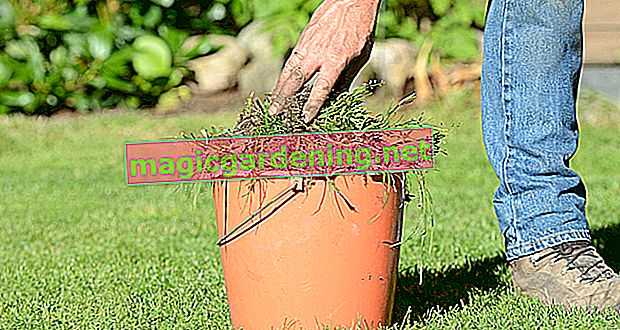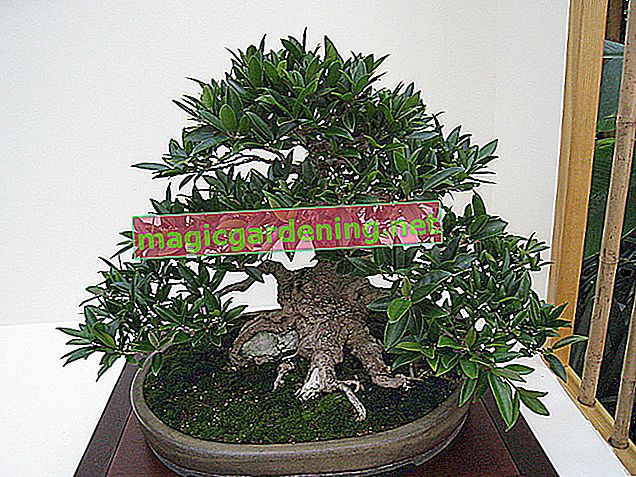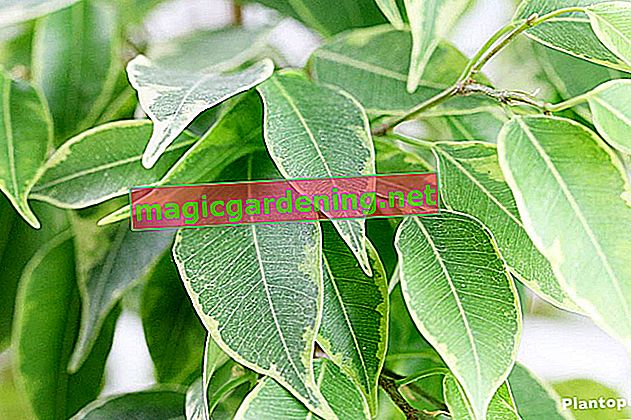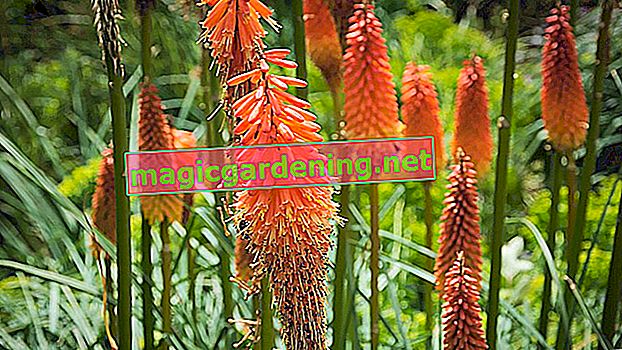
the essentials in brief
- Mechanical weeding is by far the most environmentally friendly way of removing weeds
- Nettle manure is an effective home remedy for weeds, repels insects and strengthens plants
- Weed growth can be restricted with the help of mulch (€ 213.00 at Amazon *)
- Weeds can be combated with hot water or burned with a gas burner on terraces and stone surfaces
Eliminate weeds in beds
As soon as the vegetable or flower bed is cleared of all weeds and you stand up with a painful back, the unloved plants that have just been removed seem to grow back again. So it's no wonder that some desperate gardeners prefer to use the chemical club in the face of this Sisyphean work. However, this is not necessary at all - and also does not make sense, since herbicides do not differentiate between weeds and crops - because there are some completely side-effect-free home remedies for use in vegetable and shrub beds.
also read
- Home remedy for weeds: potato water
- Soda against weeds - how does the old home remedy work?
- Baking powder - the useful home remedy for the fungus gnat
Mechanical weeding
You may not like reading this, but in fact weeding - mechanical weeding - is by far the best practice. However, you don't have to slip on your knees in the bed and dig up couch grass for hours, because with a few tricks it is much easier to pluck. This includes going into the garden immediately after a heavy downpour: Then the soil is well moistened and so loose that you can easily pull the unwanted herbs out of the earth.
Suitable tools for aching back
With the right tool, you don't even have to bend down to do this, which is easy on your back. If you choose garden tools with a long handle, you can work while standing or sitting. The following table gives you an overview of suitable devices.
| Garden tool | Appearance | use |
|---|---|---|
| Pig tooth | sickle-shaped prongs with ploughshare at the tip, attached to the long handle | Soil loosening |
| Pendulum hoe | double-edged, movable steel blade on a long handle | Weed removal by pendular back and forth movements, weeds can remain as mulch |
| Garden hoe | broad, single-edged metal blade on a long handle | Weed removal between rows of plants or close to crops |
| Field hoe | narrow, long metal blade on a long handle | Removal of deep-rooted weeds, loosening of the soil |
| Shuffle (pickaxe) | Metal blade with sloping, serrated edge on a long handle | Weed removal by pushing or pulling, soil loosening |
| Weed cutter | Lancing device on a long handle, if possible with a T-handle and footplate | Removal of root weeds |
Mulching

Weeds only grow where there is space to grow: There is no such thing as bare earth in nature, since fallow land is quickly taken over by wild herbs and other fast-growing plants. Therefore, you should not leave any open areas in the garden, as unwanted vegetation spreads just as quickly here. You should therefore cover unplanted soil - for example between rows of beds - with a thick layer of mulch. This has several advantages: on the one hand, the mulch layer suppresses the growth of weeds, on the other hand, bark mulch and other materials also prevent the soil from drying out and you have to water less. Some mulch materials can also be used for surface composting and provide the plants with valuable nutrients. In addition to bark mulch (attention: this removes nutrients from the soil,which is why you have to fertilize here too!) and bark compost, these mulch materials are suitable:
- Lawn clippings
- Wood chaff
- straw
- gravel
- Green manure plants (phacelia, spinach, yellow mustard etc.)
- chopped vegetable and garden waste
Make sure that the applied layer is at least five centimeters thick.
Versatile: nettle manure
Nettle manure is a real all-round talent in the garden, as it can be used not only to repel insects and strengthen plants, but also to control weeds. And that's how it works:
- Put one kilogram of fresh, shredded nettles with ten liters of water.
- Use rain or well-stale tap water.
- Pour the mixture into a plastic bucket or earthenware pot.
- Do not use a metal container as this will cause undesirable chemical reactions.
- Place a grid or a jute cloth over the opening of the vessel.
- Let the fermenting manure stand for at least four days.
- Stir daily.
- Stir a handful of stone flour or some valerian flower extract into the liquid manure. This will soften the unpleasant odor.
The liquid manure is ready for use when it has turned a dark color and no longer foams. Depending on the weather, this is the case after about one and a half to three weeks. For weed control purposes, you do not need to dilute the manure. Simply pour or spray them directly over the leaves of the plants to be eliminated. However, be careful not to spray neighboring crops and ornamental plants. The product should also not be used in the immediate vicinity of wells or garden water - keep a distance of at least ten meters here. Repeat the treatment if necessary.
Digression
Ground cover in the perennial bed
In the perennial bed, weeds can be suppressed quite well through the use of ground cover - since the soil is already overgrown here, the little plants hardly have a chance to develop. The selection is huge, so that there is the right type for every taste and every garden. This method is also suitable for underplanting woody plants and also to keep these areas weed-free.Remove weeds from paved garden areas

What works well in the bed is not practical on paved paths and surfaces such as the paved terrace or driveway. Heat or mechanical methods are particularly helpful here against growing weeds in the joints.
- Hot water : pour boiling water over the weeds.
- Flaming : burn the herbs with a gas burner.
- High- pressure cleaner: Simply rinse away the growth with a high-pressure cleaner (€ 85.90 at Amazon *).
However, the disadvantage of these methods is that usually only the above-ground parts of the plant are removed. The roots, on the other hand, remain in the ground, so that the plants sprout again after a while and you have to repeat the treatment. On the other hand, mechanical methods of removal help, for example using a putty knife or a knife. It may also be necessary to refill the joints as the filler material has been removed.
Digression
Seal joints
The best way to prevent weeds in pavement joints is to grout the stones with a sandy paving joint mortar. This is water-permeable, so that the area is not completely sealed, but no more weeds can pass through. Joint sand or a synthetic resin mixture also fulfill this purpose, although the latter contributes to surface sealing.Here's how to get the weeds out of the lawn
If weeds grow in the lawn, then this growth clearly shows you one thing: the growing conditions are not ideal for grasses, which is why other plants can spread. So here you have to tackle the cause very practically by the roots, because if you remove them, the weeds will also disappear.
"It is very regrettable that man calls such valuable herbs as weeds, whose remarkable properties we are now gradually discovering." (André Voisin, author of numerous gardening books)
The weeds show you what the lawn is like: For example, if you laboriously pull the tough roots of the buttercup, then its presence indicates a compact and moist soil. The same applies to pointer plants such as sorrel, usury and common plantain. As a gardener, they urgently advise you to improve and loosen the soil with humus.
Pioneering plants such as dandelion, goose thistle and geeseed provide an indication of compacted and hardened soil, while field mustard, black nightshade, nettles and burdock bedstraw mainly occur on nutrient-rich soils with a high nitrogen content.
The following article shows what causes moss in the lawn and how you can get it away again:
YoutubeStay away from these homemade weed killers
There are also numerous household remedies circulating on the Internet (and not only there) that hobby gardeners like to use to control weeds. We strongly advise against the following remedies, as they can be found in your household but are by no means non-toxic or “gentle”.
- Vinegar / vinegar essence / acetic acid / vinegar cleaner / apple cider vinegar : leads to acidification of the soil, is very difficult to break down again and quickly gets into the groundwater
- Hydrochloric acid : The soil is over-salted, which also has negative effects on useful and ornamental plants
- Citric acid : similar to vinegar
- Magnesium chloride : only use if there is a lack of magnesium in the soil, otherwise there is a risk of over-fertilization
- Detergents : Conventional detergents contain many toxic substances that kill microorganisms living in the soil and therefore have no place in the soil
In addition, the use of the above-mentioned agents on areas not used for horticulture or agriculture (ie on all paved garden areas such as paths, driveways, terraces etc.) is prohibited by the Plant Protection Act and can be fined. Although there is a court ruling from 2017 in which such a ruling was overturned, the courts are quite divided on this issue - public order offices and chambers of agriculture continue to punish the use of vinegar and salt on sealed surfaces in particular.
frequently asked Questions
Why do I actually need home remedies when there are weedkillers approved for the garden?
Just because a weed killer is approved for the hobby garden, it is still not safe. Most of these herbicides are based on ingredients such as acetic acid, pelargonic acid etc. and are therefore extremely dangerous for you as well as for the useful and ornamental plants as well as for the numerous animals in the garden. Agents like Roundup are also highly questionable, as they contain glyphosate, which is considered to be carcinogenic.
I've heard that baking soda dissolved in water also works against weeds. Is that correct?
It is not the baking powder that works against weeds, but the baking soda. In the past, baking soda used to be the main component of baking powder, today the little sachets usually contain the acidifier potassium hydrogen carbonate. This has no effect on weeds.
How can weeds still be controlled?
It is best to prevent weeds as much as possible by displaying weed fleece (€ 28.90 at Amazon *) and black foils. Both can be easily installed in the bed and covered with fresh soil.
Tips
Do not throw weeds on the compost and, above all, do not leave root weeds lying in the bed: the plants can, if they are already seed ripe or about to seed, multiply by self-sowing or sprout again from small parts of the roots.








